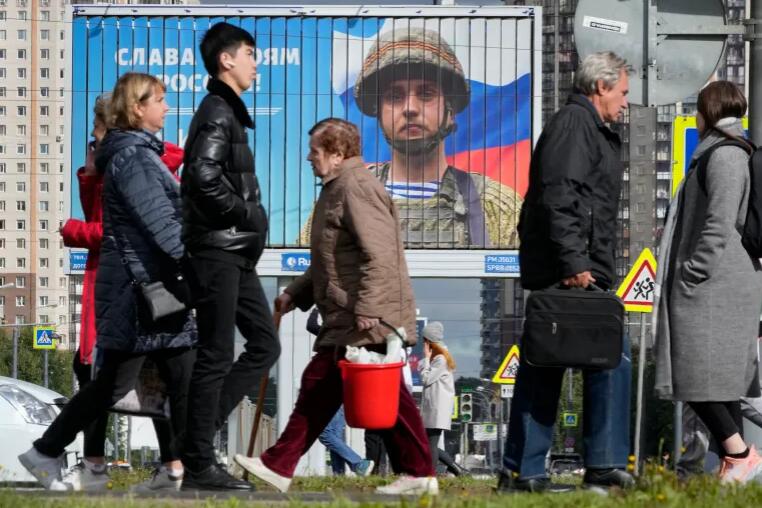On the night of January 4, a section of tracks along the Trans-Siberian Railway in Russia’s Krasnoyarsk region was blown up. The rail line was used by the Russian army to transport supplies to Ukraine.
A photo and video clip of an explosion ripping through a railway bridge were posted on Telegram by an organisation calling itself BOAK, the Combat Organisation of Anarcho-Communists.
According to Ukrainian intelligence, this was the sixth such incident this year after 40 during all of 2022, suggesting that anti-war resistance in Russia is growing bolder.
Since the invasion of Ukraine in February, Russian-occupied territories there have experienced regular sabotage from the Ukrainian resistance. But in Russia and Belarus, a secret network of activists is also doing its best to slow down the Russian war machine.
“We are not only against Putin and the war but also against Russian imperialism and against the existing capitalist system of oppression in general,” a BOAK representative told Al Jazeera by email.
BOAK describes itself as anarcho-communist, meaning it seeks a decentralised society in harmony with nature with a focus shifted away from profit and onto the needs of the people. It rejects all forms of inequality and oppression.
This puts it at odds with Russia’s Communist Party, which embraces Stalinism and enthusiastically rallies behind President Vladimir Putin’s invasion of Ukraine.
“We are disgusted by this fratricidal bloodbath, and we believe only by halting Putin’s aggression we can hope for this to stop and to never happen again,” the BOAK representative continued.
“The government’s defeat in this imperialist war opens up opportunities for the revolutionary movement, giving people the chance to realise how oppressed they were, and what needs to change. We understand that these goals can only be achieved through revolutionary change, and in order to be implemented effectively, it is necessary to have an underground organisation operating using partisan and guerrilla methods.”
Partisans
BOAK and other Russian anti-war groups such as Stop the Trains call themselves partisans after the resistance to Nazi occupation during World War II when fighters hid in the forests of Belarus, Ukraine and western Russia and launched attacks on German forces.BOAK claims to have been in existence for 10 years, but it said that before the war in Ukraine, it largely spent its time building its network and gathering resources. In 2019, BOAK claimed responsibility for burning down a cellphone tower owned by a Turkish company in Kyiv over Ankara’s incursion into northern Syria.
BOAK says it consists of several dozen cells of various sizes that operate independently, but the central network may help coordinate or publicise their actions. The central organisation follows a horizontal command structure, meaning that decisions that affect everyone in the organisation are made by consensus.
The group locates their targets through open-source websites such as Wikimapia, and posts the results of its work on Telegram along with detailed instructions for other would-be saboteurs. In August, Telegram was fined by Russian authorities for refusing to take down the anarchists’ material.
A favourite target of BOAK is railroads, which the army uses to move supplies to the front line.
“They are the blood vessels that feed Russian aggression,” the representative explained. “It is along them that soldiers, equipment and ammunition are delivered. Stop them, and the Russian army will choke without resources.”
At first, Russian authorities tried to play down the partisans’ activities, blaming derailments on faulty train lines, until Russian citizens started being arrested for committing acts of sabotage.
Other targets have included army recruitment centres, police stations, national guard buildings and the ruling United Russia party’s offices. Since the start of the war, scores of draft offices and government buildings have been set alight, usually with Molotov cocktails, according to the independent Russian media outlet MediaZona.
It’s not clear how many of these fires were directly orchestrated or inspired by BOAK. Some were caused by arsonists of various political persuasions and unaffiliated individuals on their own initiative.
“While we can always be sceptical of claims, what we do know is claims of attacks and proof of those attacks, including photos and videos, are frequent enough that certainly attacks are occurring quite frequently, perhaps several per week,” Jeff Hawn, a non-resident fellow at the New Lines Institute think tank, told Al Jazeera.
“Most, however, have very minimal impact: delaying but not stopping mobilisation of reservists from certain regions and hampering the movement of supplies to the front,” Hawn said “However, from a moral perspective, the impact is much larger. The regime knows the war is making people more willing to fight them directly, and Russian soldiers at the front know people behind the lines are against them.”
Lethal force
Although the group has not yet carried out any assassinations, it is not against the use of lethal force and said it would only target state security officials. It said it takes care to minimise the risk to passers-by by targeting railways near military targets where civilian trains are unlikely to travel.
“We consider the destruction of the oppressors of the people quite acceptable,” the spokesperson said.
Serious doubt has been cast on reports of assassination plots by other groups.
In August, Darya Dugina, a journalist and daughter of ultra-nationalist philosopher Alexander Dugin, died in a Moscow car bombing likely meant for her father. The Kremlin accused Kyiv of being behind her death, but Ilya Ponomarev, an exiled former member of Russia’s parliament now based in Kyiv, claimed it was the work of the National Republican Army (NRA), a secret organisation dedicated to the overthrow of Putin.
However, historian Sergey Radchenko told Al Jazeera that the NRA does not exist.
“Persistent rumours to this effect, when they are not part of some psyop operation, merely point to people’s frustration with the seeming political stability of Putin’s regime and suggest wishful thinking, which unfortunately is not rooted in any evidence,” Radchenko said.
In April, six members of the outlawed National Socialism/White Power group were arrested by security services after allegedly plotting to assassinate TV pundit Vladimir Solovyov, a vocal cheerleader of Putin and the war.
While the neo-Nazis group has thrown Molotov cocktails at draft offices, there are doubts over the official version of events in the supposed Solovyov plot with media reports suggesting the alleged crime scene was clumsily staged.
Hawn said the groups engaged in anti-war activities have a wide range of ideologies and do not have a united vision for a post-Putin Russia, even as they unite against the president.
“It’s hard to see these actions [real or otherwise] being the beginning of something bigger,” Hawn said. “However there is room for escalation.”
“[It] is likely as time goes on, we will see tradecraft improving and a growing effectiveness in attacks,” he said.
Railroad saboteurs have also been active in Belarus. Although it is not formally taking part in the war, the country is being used by Russian forces as a logistics hub.
In Belarus, a number of railway saboteurs have been convicted of “terrorism”, which since May carries the death penalty.
In the last days of December, Putin signed legislation into law that punishes the crime of sabotage with up to a life term in prison; up to 20 years for aiding, training or organising saboteurs; and up to 10 years for being part of a sabotage group.
But BOAK said it is determined to continue its struggle for the overthrow of Putin.
“We understand that such transformations do not happen overnight,” its spokesperson wrote.

